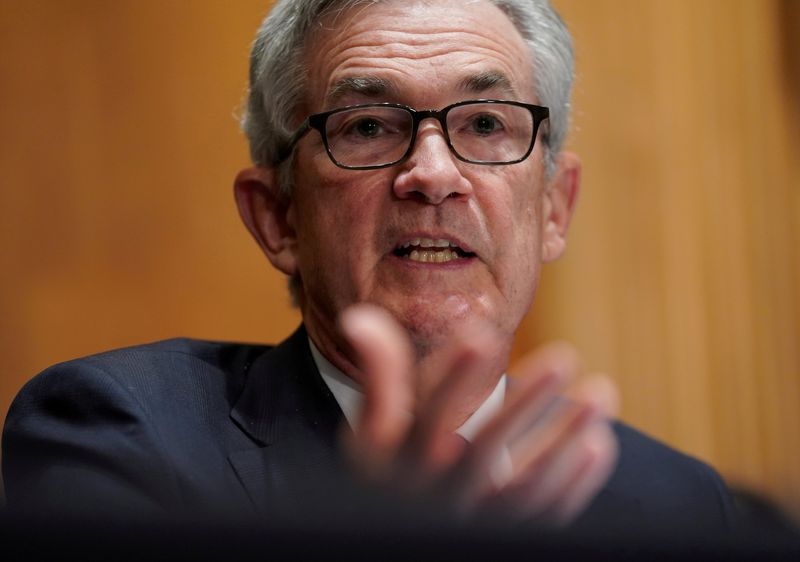Investing.com — U.S. Treasury yields soar to the highest levels since the financial crisis after a speech by Fed chair Jerome Powell, dragging stocks lower. Crude rises as the U.S. looks to refill its strategic reserves, while U.K. retail sales slumped in September.
1. hits 5%
Jerome Powell offered something for everyone in his speech before the New York Economic Club on Thursday, leaving open the possible need for more rate hikes because the economy had proved stronger than expected, but also noting emerging risks and a need to move with care.
“A range of uncertainties, both old and new, complicate our task of balancing the risk of tightening monetary policy too much against the risk of tightening too little,” he said.
“We will make decisions … based on the totality of the incoming data, the evolving outlook, and the balance of risks.”
Yields on the benchmark 10-year Treasury rose briefly to 5%, a level not seen since 2007, and stocks sold off, with the broad-based ending down 0.9%.
The recent surge in long-term bond yields suggests the market has embraced the idea that rates will remain higher for longer, with economic activity having proved to be more resilient to higher borrowing costs so far than many had predicted.
And these yields don’t look likely falling too much going forward as the supply of U.S. Treasuries can only increase with U.S. President Joe Biden asking Americans to spend billions more dollars to help both Israel and Ukraine.
The rise in U.S. yields has had repercussions elsewhere, with the Bank of Japan intervening in the Japanese government bond market on Friday for the fifth time this month after its 10-year yield pushed to a fresh decade high.
2. Futures slip after Powell’s speech
U.S. stock futures slipped lower Friday, on pace for weekly losses as investors fretted over rising bond yields and the potential repercussions of the Israel-Hamas war.
At 05:00 ET (09:00 GMT), the contract dropped 25 points or 0.1%, fell by 3 points or 0.1%, and dropped by 18 points or 0.1%.
The major indices closed lower Thursday after the benchmark 10-year Treasury yield climbed to levels not seen since the 2007 financial crisis [see above] following Federal Reserve Chair Jerome Powell saying the U.S. central bank is “proceeding carefully” on monetary policy decisions while acknowledging that signs of ongoing economic growth could warrant further policy tightening.
The major averages are on pace for losses on the week. The is down 1.2% through Thursday’s close, while the is off 1.7% and the is down nearly 0.8%.
Investors have also been taking some risk off the table in recent days in light of the outbreak of war in the Middle East and associated uncertainty.
The economic data slate is largely empty Friday, although appearances from Fed officials and will attract attention in the wake of Jerome Powell’s speech.
There are more earnings to digest during the session, including numbers from financial giant American Express (NYSE:), regional banks Regions Financial (NYSE:) and Comerica (NYSE:) as well as oilfield services company Schlumberger (NYSE:).
3. U.K. retail sales slumped in September
The U.K. consumer is struggling, having faced a cost-of-living squeeze over the past two years, amplified by a surge in energy costs after Russia invaded Ukraine.
fell by 0.9% in September compared with the month before, data showed Friday, considerably weaker than the fall of 0.2% expected.
“Retailers reported that the fall over the month was because of continuing cost of living pressures, alongside the unseasonably warm weather reducing sales of autumn-wear clothing,” the Office for National Statistics said.
These economic difficulties are having political ramifications, with the ruling Conservative Party losing popular support.
The opposition Labour Party won two by-elections on Thursday, overturning huge Conservative majorities in the constituencies of Tamworth and Mid Bedfordshire – results that can be viewed as significant markers ahead of next year’s general election.
4. China Evergrande revises debt restructuring deal
China’s property sector debt crisis took another step into the unknown Friday, after the China Evergrande Group (HK:) said it was revising the terms of a proposed offshore debt restructuring deal, without providing details.
The embattled property developer’s restructuring plan failed to meet regulatory requirements last week, prompting bondholders to raise concerns about a possible liquidation.
Meanwhile, peer Country Garden (OTC:) has also missed a $15 million coupon repayment, putting it at risk of default.
Non-payment would put the developer at risk of default on its nearly $11 billion of outstanding offshore bonds and could trigger one of China’s biggest corporate debt restructurings.
This would likely exacerbate the country’s real estate crisis and could delay the prospect of a recovery of the wider Chinese economy.
5. Crude boosted by U.S. plans to refill SPR
Crude prices rose Friday, on track for weekly gains given the heightened geopolitical tensions in the Middle East as well as U.S. plans to begin refilling its strategic oil reserves.
By 05:00 ET, the futures traded 1.4% higher at $89.61 a barrel, while the contract climbed 1.3% to $93.56 a barrel.
Both contracts are on course for a second consecutive positive week, with gains of between 1.5% and 2.2%, as an explosion at a Gaza hospital this week and the anticipated ground invasion by Israeli troops heightened fears of the conflict spreading in this important oil-rich region.
The market also received a boost by the news that President Joe Biden has revived his bid to refill the heavily-drawn Strategic Petroleum Reserve.
The Department of Energy announced two separate offers of crude purchases on Thursday totaling 6 million barrels, to be delivered between December this year and January 2024.
The U.S. government had drawn about 200 million barrels from the SPR since early-2022, bringing the reserve to its lowest level in nearly 40 years in a bid to combat high gasoline prices following the onset of the Russia-Ukraine war.
Read the full article here
